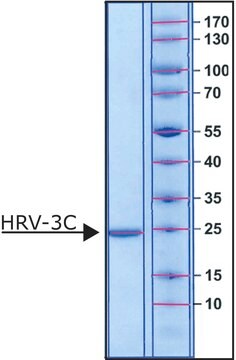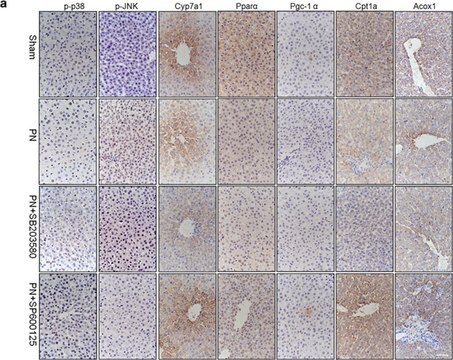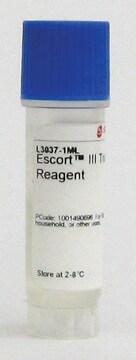AB9916
Anti-CYP2b10 Antibody
serum, Chemicon®
Synonym(s):
Cytochrome P450 2b10
Sign Into View Organizational & Contract Pricing
All Photos(1)
About This Item
UNSPSC Code:
12352203
eCl@ss:
32160702
NACRES:
NA.41
Recommended Products
biological source
rabbit
Quality Level
antibody form
serum
antibody product type
primary antibodies
clone
polyclonal
species reactivity
mouse
manufacturer/tradename
Chemicon®
technique(s)
western blot: suitable
NCBI accession no.
UniProt accession no.
shipped in
wet ice
target post-translational modification
unmodified
Gene Information
mouse ... Cyp2B10(13088)
General description
CYP2b10 (Cytochrome P450, family 2, subfamily b, polypeptide 10) is a member of the cytochrome P450 superfamily of monooxygenase enzymes which catalyze many reactions involved in drug metabolism and the synthesis of cholesterol, steroids and other lipids.
Specificity
AB9916 is specific for CYP2b10.
Immunogen
Epitope: AA I182 – T205
Recombinant 2b10
Application
This Anti-CYP2b10 Antibody is validated for use in WB for the detection of CYP2b10.
Quality
Routinely evaluated by immunoblot.
Target description
58kDa
Legal Information
CHEMICON is a registered trademark of Merck KGaA, Darmstadt, Germany
Not finding the right product?
Try our Product Selector Tool.
Storage Class Code
10 - Combustible liquids
WGK
WGK 1
Certificates of Analysis (COA)
Search for Certificates of Analysis (COA) by entering the products Lot/Batch Number. Lot and Batch Numbers can be found on a product’s label following the words ‘Lot’ or ‘Batch’.
Already Own This Product?
Find documentation for the products that you have recently purchased in the Document Library.
Shinhee Park et al.
Acta pharmaceutica Sinica. B, 6(5), 475-491 (2016-10-07)
Intestine is responsible for the biotransformation of many orally-exposed chemicals. The constitutive androstane receptor (CAR/Nr1i3) is known to up-regulate many genes encoding drug-metabolizing enzymes and transporters (drug-processing genes/DPGs) in liver, but less is known regarding its effect in intestine. Sixty-day-old
Kentaro Nobutani et al.
Pharmacology research & perspectives, 5(5) (2017-10-04)
Herbal medicines and natural products used for maintenance of health or treatment of diseases have many biological effects, including altering the pharmacokinetics and metabolism of other medications. Daikenchuto (TU-100), an aqueous extract of ginger, ginseng, and Japanese green pepper fruit
Cindy Yanfei Li et al.
Toxicological sciences : an official journal of the Society of Toxicology, 153(2), 282-302 (2016-07-15)
Safety concerns have emerged regarding the potential long-lasting effects due to developmental exposure to xenobiotics. The pregnane X receptor (PXR) and constitutive androstane receptor (CAR) are critical xenobiotic-sensing nuclear receptors that are highly expressed in liver. The goal of this
Xia Wen et al.
The Journal of pharmacology and experimental therapeutics, 344(1), 244-252 (2012-10-12)
Phase II enzymes, including Ugts, Sults, and Gsts, are critical for the disposition and detoxification of endo- and xenobiotics. In this study, the mRNA and protein expression of major phase II enzymes, as well as key regulatory transcription factors, were
p53-mediated regulation of bile acid disposition attenuates cholic acid-induced cholestasis in mice.
Pan Chen et al.
British journal of pharmacology, 174(23), 4345-4361 (2017-09-15)
The tumour suppressor p53 is traditionally recognized as a surveillance molecule to preserve genome integrity. Recent studies have demonstrated that it contributes to metabolic diseases. Here, we investigated the role of p53 in the regulation of bile acid disposition and
Our team of scientists has experience in all areas of research including Life Science, Material Science, Chemical Synthesis, Chromatography, Analytical and many others.
Contact Technical Service







